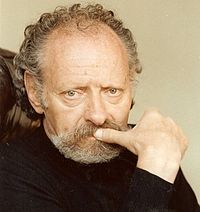- Mordechai Rotenberg
-
Mordechai Rotenberg (1932 - ) (Hebrew: מרדכי רוטנברג) is an Israeli professor of social work at the Hebrew University of Jerusalem.
Contents
Biography
Mordechai Rotenberg was born in Breslau, Germany (today Wrocław, Poland). His father was from Warsaw, descended from Rabbi Yitzchak Meir Alter, the founder of the Hasidic sect. His father owned a publishing house in Bratslav. In 1939, on the eve of World War II, the family immigrated to Palestine. Rotenberg's father opened a small printing press in Jerusalem. Rotenberg grew up in a Haredi household, with three brothers and a sister.[1]
In 1960, he graduated from the Hebrew University. In 1962, he received his MSW from New York University. In 1969, he was awarded a Ph.D. at University of California, Berkeley.[2]
In 1970, Rotenberg joined the faculty of the Hebrew University of Jerusalem, becoming a full professor in 1980. He founded a new sub-discipline in psychology and religion. He is the author of ten books, which have been translated into English, French, Portuguese and Japanese. Rotenberg has taught at University of Pennsylvania, University of California, Berkeley, the Jewish Theological Seminary, City University of New York and Yeshiva University.[3]
Clinical approach
Rotenberg has developed innovative theories based on psychological interpretations of Hasidic and Midrashic concepts.[4] He describes his approach as "re-biography", i.e., "rereading one's biography so it becomes possible to live with the text." In an interview with Haaretz newspaper he said: "All of life is a text, and I am proposing a new term - recomposition, rewriting the melody of life. You do not have to erase the past, but it can be re-composed, and to that end I cite examples from the Gemara."[5]
Tzimtzum paradigm
Rotenberg has adopted the Kabbalistic-Hasidic tzimtzum paradigm, which he believes has significant implications for clinical therapy. According to this paradigm, God's "self-contraction" to vacate space for the world serves as a model for human behavior and interaction. The tzimtzum model promotes a unique community-centric approach which contrasts starkly with the language of Western psychology.[6]
Awards
In 2009, Rotenberg was awarded the Israel Prize for social work, in connection with his research in social welfare.[7][8]
Published works
- Damnation and Deviance: The Protestant Ethic and the Spirit of Failure
- Rewriting the Self: Psychotherapy and Midrash
- The Yetzer: A Kabbalistic Psychology of Eroticism and Human Sexuality
- Hasidic Psychology: Making Space for Others
- Creativity and Sexuality: A Kabbalistic Experience
- Between Rationality and Irrationality: The Jewish Psychotherapeutic System
- Dialogue With Deviance
- The Trance of Terror, Psycho-Religious FundaMentalism: Roots and Remedies
- Dia-logo Therapy: Psychonarration and PaRDeS
- Re-Biographing and Deviance: Psychotherapeutic Narrativism and the Midrash
See also
References
- ^ Talking to the spirits
- ^ Rotenberg Center for Jewish Psychology
- ^ Rotenberg Center for Jewish Psychology
- ^ Rotenberg Center for Jewish Psychology
- ^ Talking to the spirits
- ^ Rotenberg Center for Jewish Psychology
- ^ "Israel Prize Official Site (in Hebrew) - Recipient's C.V.". http://cms.education.gov.il/EducationCMS/Units/PrasIsrael/PrashTashsath/MordechayRotenberg/CvMordechayRotenberg.htm.
- ^ "Israel Prize Official Site (in Hebrew) - Judges' Rationale for Grant to Recipient". http://cms.education.gov.il/EducationCMS/Units/PrasIsrael/PrashTashsath/MordechayRotenberg/NsMordechayRotenberg.htm.
External links
Categories:- 1932 births
- Living people
- Israel Prize in social work recipients
- Social workers
- Israeli psychologists
- Hebrew University of Jerusalem alumni
- Hebrew University of Jerusalem faculty
- New York University alumni
- University of California alumni
- Israeli Jews
- German Jews
- German emigrants to Israel
- Israeli people of Polish origin
- People from Wrocław
Wikimedia Foundation. 2010.

